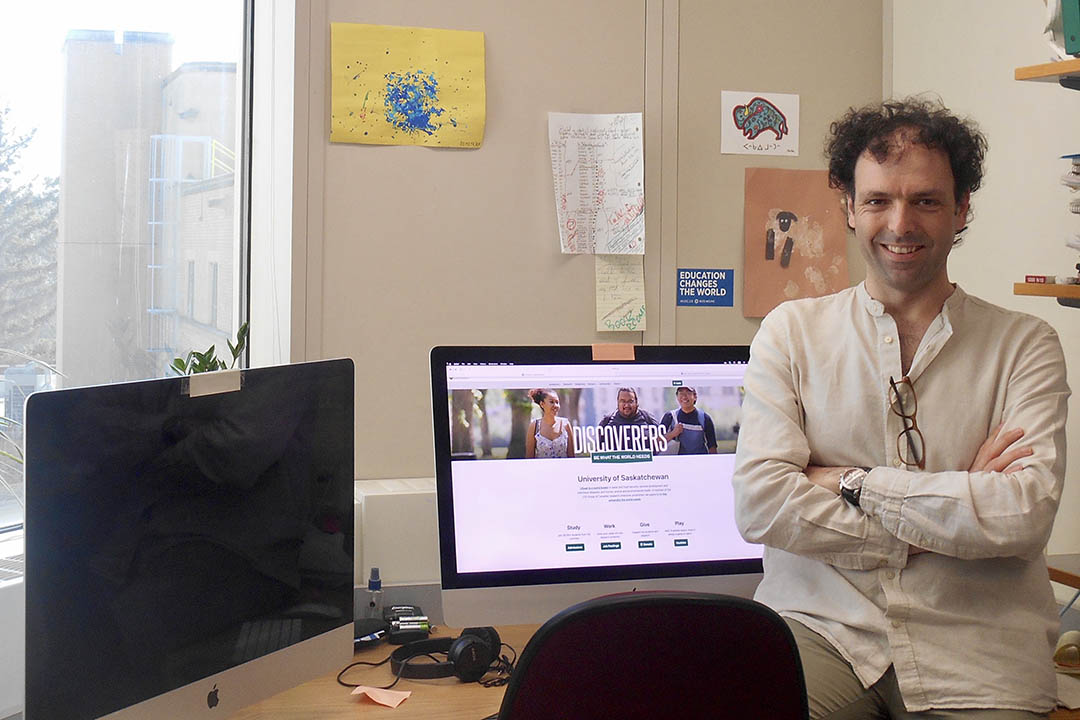
USask graduate explores economics of Canadian wheat genetic improvement
Lampros Nikolaos Maros’ thesis research focused on farmers’ adoption of wheat varieties and the economics of wheat varietal development, which affects long-term food security.
By Brett Makulowich“Agricultural and resource economics research impacts food security, food safety and the sustainable use of natural resources,” said Lampros Nikolaos Maros. “This research is important for our own future and the futures of the generations to come.”
Inspired by his passion for agricultural economics and the reputation of the University of Saskatchewan (USask), Maros moved from Greece to Canada to study at USask. He will officially receive his PhD in Agricultural Economics at USask Spring Convocation on June 4.
In January 2025, he successfully defended his thesis, Three essays on economics of Canadian wheat genetic improvement. Maros was supervised by Dr. Richard Gray (PhD), professor in the Department of Agricultural and Resource Economics (ARE) at the College of Agriculture and Bioresources (AgBio).
His thesis was three manuscripts that he co-authored, along with Gray. The second and third manuscripts include Yuan Chai and Philip G. Pardey as co-authors. Maros conducted his research via literature reviews, geospatial software, and programming language to analyze big data.
“The first manuscript looked at how farmers choose which wheat variety to plant, focusing on the variety’s resistance to the fungal disease Fusarium head blight,” said Maros. “We also incorporated each farmer’s ability to use seeds they save.”
“The second manuscript estimated the economic benefits compared to the costs of developing new wheat varieties in Western Canada,” said Maros. “The third manuscript explored how to fairly share the benefits of developing new wheat varieties between the breeders and ancestral plant sources, while continuing to encourage new varieties.”
The results of this research are important for long-term food security and reflect how wheat development commissions, funding organizations and breeders can prioritize their wheat varietal development based on farmers’ varietal adoption. The research also shows the economic benefits of supporting wheat varietal development.
“The benefits of wheat breeding in Western Canada have been almost sixty times as large as the costs of creating improved wheat varieties,” said Maros. “We estimate that around one quarter of the increase in commercial yields, over the 50-year period (1970-2019), is attributed to wheat varietal development. The cumulative benefits of Western Canadian wheat varietal development are CDN $34.1 billion between 1970 and 2019 (in 2019 prices).”
Fair benefit sharing in crop varietal development is when individuals and groups who grant access to their plant genetic resources receive a fair portion of both the financial and non-financial benefits gained from the utilization of these resources. This includes the farmer’s rights, research expertise, and knowledge.
“The research introduces a method to fairly share the benefits from crop varietal development, which helps the conservation and sustainable use of ancestral genetic materials that are critically important for long-term food security,” said Maros.
Maros’ thesis research is part of the 4DWheat: Diversity, Discovery, Design and Delivery project funded by USask, Saskatchewan Wheat Development Commission, Government of Saskatchewan, Genome Canada, Genome Prairie, USask Crop Development Centre, Agriculture and Agri-food Canada, Alberta Wheat Commission, Western Grains Research Foundation, and Manitoba Crop Alliance.
Maros excelled during his PhD studies and received seven scholarships and funding awards, including the Saskatchewan Wheat Development Commission Graduate Scholarship. He made an impression socially as the president of ARE Graduate Student Society and worked as a teaching assistant.

From Greece to the University of Saskatchewan
Growing up in the village of Sourpi in the Prefecture of Magnesia, Greece, Maros went on to earn his bachelor’s degree in Agricultural Economics and Rural Development from the Agricultural University of Athens. He completed his Master of Science in Business Economics & Management from the Mediterranean Agronomic Institute of Chania (MAICh).
He was a student at MAICh when he first heard about USask from a visiting professor, Dr. Konstantinos Karantininis (PhD), who is an alumni of USask. Maros was impressed by the reputation of AgBio and the Dept. of ARE.
“I remember when I first came to the Dept. of Agricultural and Resource Economics at the University of Saskatchewan,” said Maros. “I immediately felt like I belonged to a community. Faculty members, staff and students contribute to this group environment. This community feeling is important, especially for international students who are out of their comfort zone and facing challenges.”
Maros is happy to continue with the ARE department, now working as a research officer. He’s working on two projects with Gray. The first is a multidisciplinary project led by the USask Dept. of Geography and Planning about consumers’ willingness to pay for meat and dairy products produced in sustainably managed grasslands. The second project is with the ARE department and is evaluating specific Canadian wheat varietal development programs.
“Investigating unexplored topics, or applying new methods to already studied topics, is a challenging process, but it is rewarding,” said Maros. “With effort, research can find solutions to the major challenges facing humanity.”
Together we will support and inspire students to succeed. We invite you to join by supporting current and future students' needs at USask.

